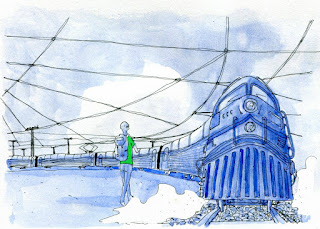Protocollo C came to life in 2012 in Bra, a town in the province of
Cuneo, with a line up featuring Marco Vona (guitar), Daniele Sagli
(drums), Alessandro Aiello (organ, keyboards) and Alessandro
Dellarocca (bass). Soon they started to experiment and compose
original stuff and in 2017 they recorded an interesting eponymous
debut album that was released in 2018 on the independent label Lizard
Records. On this work you can listen to an excellent mix of vintage
sounds with echoes of the incredible Jimmy Smith at the organ, a
pinch of blues and a touch of funky-prog with a strong penchant for
seventies soundtracks of Italian B-movies in the vein of bands such
as La Batteria or Calibro 35. In fact, this is an instrumental
concept album, an imaginary soundtrack where every piece represents a
phase of the life of a common man. In the booklet you can find a
drawing by Matteo Manera and a short comment by Chiara Fissore for
every piece describing in some way what the music is about. Anyway,
the listener is always the main protagonist...
The nice opener “Adolescenza” (Adolescence) starts by a cheerful,
carefree marching beat and describes a period in a man life where
everything seems possible. It contrasts with the following “Maturità”
(Maturity) and its staid, obsessive pace and sudden frenzied passages
that mark the need to achieve the goal to find a job and settle down
in the period of life when a man is supposed to sign a deal with the
future...
“Perdita della routine” (Loss of routine) is darker and deals
with the stifling formality of family life and the work daily grind.
The burden of acting always by rote drives you crazy, tension rises
as you feel the need to assert yourself and you try to find a way out
from your monotonous routine. Next comes “Premeditazione”
(Premeditation) that marks the effort to break through from the cage
of your reality reacting against the mocking twists of the fate that
made your life so uninteresting and boring...
The nervous, tense “Metamorfosi degli innocenti” (Metamorphosis
of the innocents) expresses the tearing choice to get rid of the mask
you wear every day to hide your feelings while the following “Presa
di coscienza” (Realization) marks the bewilderment of a personal
crises where everything gets blurred and regrets become heavier and
heavier...
The up tempo of “Fierezza” (Proudness) swings from reggae to
funky rock to underline the will to get up, stand up and fight for
your dreams. You need strength and boldness to look inside yourself
and find the positive energies you need to get free... The following
“Consapevolezza” (Awareness) tries to convey the idea of analysis
and reflection. Once you know the hidden aspects of your
personality, you can begin to rebuild your life and consider new
plans for your future...
The drawing associated to “Goodbye Italia” suggests a new start,
a train to catch and new challenges on the horizon. The folkloric
elements in the music and the lively rhythm show that for you there
are no borders now and the world is your home... Eventually, the
long final track entitled “Flashback” makes you relive the
different phases of your life as in a dream, from the years of youth
to the present.
On the whole, a very pleasant listening!
You can listen to the complete album HERE
More
info:













